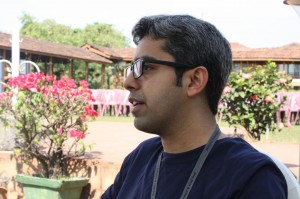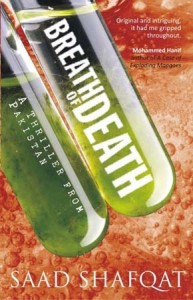 Onwards with our exclusive coverage of the IV Goa Arts and Literary Festival!
Onwards with our exclusive coverage of the IV Goa Arts and Literary Festival!
Somewhere between sessions and panel discussions, we caught up with Pakistani writer Bilal
Tanweer who was launching his debut novel The Scatter Here is Too Great at GALF 2013. Bilal is a writer, teacher and translator. He holds an MFA in Writing (Fiction) from Columbia University, and is the founder of the fantastic LUMS Young Writers Workshop and Short Story Contest, now entering its third year. The Scatter Here is Too Great was published by Random House India in November 2013.
Farheen Zehra (FZ) Tell us a little about the book and the title. Why “The Scatter Here is Too Great”?
Bilal Tanweer (BT) Among the various themes of the novel, one of the themes is our need to tell stories. My book is composed of short inter-related stories, through which I have tried to make sense of Karachi’s reality. Life in this city is overwhelming and I think we use stories to make sense of our own stories, which is a major theme of the book.
(FZ) The blurb on your book says, ‘This is a love story to Karachi’. Is it really, and if so, why?
(BT) We travel to many cities but there is always one city inside us that we care about the most, which becomes a primary reference point for us to make sense of the world. For me that city is Karachi. It is the city I care about the most. But it is also a madly, ruinously complex city and one may never find a story that does complete justice to it.
 (FZ) Have you focused on any particular area of Karachi or written about it as a whole?
(FZ) Have you focused on any particular area of Karachi or written about it as a whole?
(BT) Karachi is such a huge city that it is impossible to think of the complete picture. My narratives are as limited as they can possibly get. Each story is from the point of view of a particular character. The first story is from the P.O.V of a child from a middle class family. Then there is one sketch of a boy from Nazimabad. The book depicts stories of everyday people living in the chaos that is Karachi and I hope readers from Karachi might be able to relate to the stories.
(FZ) So who is your intended audience?
(BT) I think the whole question of ‘audience’ is very muddled. As a writer, I’m not focused on the audience. The reality of publishing is that the people who are paying you to write are abroad. In my case, all my intellectual training is in English but that doesn’t mean I was thinking of a reader in New York while writing the book, because that reader can never understand Karachi the same way. As far as I’m concerned, I am the first and foremost audience of my work.
(FZ) Why launch the book at GALF?
(BT) The organizers invited me to launch my book here. It’s a great festival with brilliant conversations on the margin so I think it was a very appropriate setting for my book launch. Also, I love Goa. It makes me think of Karachi of yore, which comes as no surprise as both the cities share strong connections and similarities.
The Scatter Here is Too Great is the DWL Karachi Readers’ Club’s first read for 2014.










 As the name indicates, American Gods was overflowing with gods of all shapes and sizes from a variety of cultures and countries. There were Native American gods, Egyptian gods and European gods whose origins were from mythology, folklore or old wives’ tales. A lot of these were unfamiliar to us and as Omer pointed out, he spent some time Googling the various gods and goddesses in the book just to understand the story better. (I did too and ended up jumping from one link to another because the origins of some of the gods made for quite an interesting read.)
As the name indicates, American Gods was overflowing with gods of all shapes and sizes from a variety of cultures and countries. There were Native American gods, Egyptian gods and European gods whose origins were from mythology, folklore or old wives’ tales. A lot of these were unfamiliar to us and as Omer pointed out, he spent some time Googling the various gods and goddesses in the book just to understand the story better. (I did too and ended up jumping from one link to another because the origins of some of the gods made for quite an interesting read.)